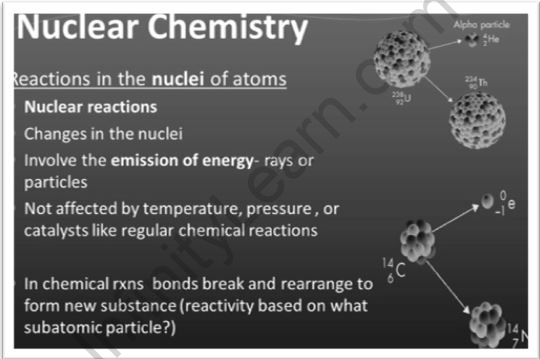Table of Contents
Nuclear chemistry is a branch of chemistry that studies radioactivity, nuclear processes, and atomic nuclei alterations like nuclear transmutation and nuclear characteristics. It comprises the chemistry involving radioactive elements such as actinides, radium, and radon, as well as the chemistry associated with nuclear-processing equipment.
A Brief Outline
It encompasses the investigation of the chemical effects of radiation absorption in live creatures, plants, and other things. Because radiation has a chemical influence on living things, radiation chemistry governs much of radiation biology. To put it another way, radiation modifies the biochemicals within an organism, and this change in chemistry changes the chemistry that occurs within the organism.
Important Concepts
Radiation and Nuclear Reactions
Rutherford distinguished three types of radioactive radiations in 1902 by passing them across two oppositely charged plates.
- Alpha rays are those which bend towards a negative plate and transport a positive charge.
- Beta rays are those that bend towards the positive plate and carry a negative charge.
- Gamma rays are the third type, which is uncharged and travel straight through the electric field.
Radiation of Alpha
It’s the part of an alpha particle’s emission that comes from the nucleus of an atom. The particle is comparable to the Helium (He)nucleus 4He2 in that it has two protons and two neutrons. The atomic mass of an atom reduces by 4 units when it emits a particle.
Radiation of the Beta
The conversion of a neutron into a neutron and an electron is known as neutron transmutation. The mass of an atom does not change when it emits a particle. The number of atoms in the universe will increase by one.
Gamma Radiation
It involves the nucleus of an atom emitting electromagnetic radiation. Because no particles are produced during gamma radiation, it does not cause atoms to transmute.

Significance of nuclear chemistry in IIT JEE exam
Owing to the reduced weightage for the sections, the nuclear chemistry chapter has a weightage of around 5% in all years. This suggests that the main questions from this topic would be between 2 or 3, each worth 8 points.
FAQs
Nuclear fission is a reaction in which the nucleus of an atom divides into smaller pieces, releasing a large amount of energy in the process.
Nuclear fusion is a reaction in which two or more elements fuse to form a bigger element, releasing a lot of energy in the process.
If utilized inappropriately and for the wrong objectives without consulting an expert, radiation can be extremely hazardous. Because some people try to utilize the effects of radiation to hurt others. What is known as nuclear fission?
What is known as nuclear fusion?
What are the effects of radiation on the human body?





